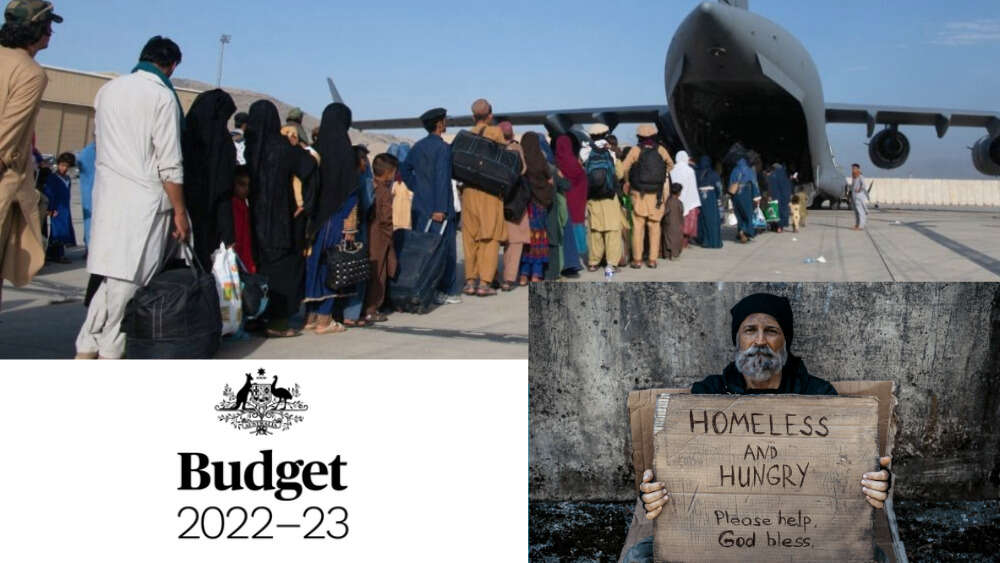Mission Australia has criticised last night’s federal budget for lack of action on climate change, along with inadequate investment in affordable housing, income support, and measures to prevent and respond to domestic and family violence.
Mission Australia CEO Sharon Callister said inadequate funding for affordable housing and income support would push more people into homelessness, notably older people – who were among the fastest-growing groups of those who are homeless – and people escaping domestic and family violence.
She welcomed an increase in the cap on the National Housing and Finance Investment Corporation (NHFIC), but said plans to help first homeowners would not help most of the 275,000 people experiencing homelessness each year.
Callister said the scale of the homelessness problem required national leadership. She called on the federal government to create a national plan to end homelessness in partnership with the state and Territory governments, service providers and people with lived experience.
“Australia is grappling with a housing affordability crisis, social housing waiting lists of more than 200,000 people and a rate of JobSeeker and other income support payments that leave many in poverty and unable to pay their rent.
“This plan must also include targets to end Aboriginal and Torres Strait Islander homelessness and investment in Aboriginal and community-controlled housing, including in remote areas,” she said.
Callister also called on the federal government to increase the base rate of income support payments to a level that would keep people out of poverty and homelessness, and to increase Commonwealth Rent Assistance by at least 50 per cent.
“The work now begins to make sure this money is invested smartly.” – Daniel Wordsworth, CEO of World Vision Australia
World Vision Australia welcomed an increase in the aid budget for crises – such as those in Ukraine, Afghanistan, Myanmar and Bangladesh – from $114.3 million to $144.9 million.
CEO Daniel Wordsworth said the budget measure was a win for vulnerable children facing long-term uncertainty, as the world experienced an unprecedented number of humanitarian crises.
“There is a new wave of conflict and fragility sweeping the globe. Previously stable countries – such as Ethiopia, Myanmar and now Ukraine – are experiencing outbreaks of violence, war and growing instability, ushering in a new era of fragility.
“By 2030, 80 per cent of the world’s extreme poor will live in fragile countries and this is the biggest challenge facing humanitarians,” he said.
Wordsworth said 44 million people were also on the brink of famine, and conflict and climate change were only making things worse, as food prices soared.
World Vision is advocating that these new federal funds be directed to address the needs of children, escalating global hunger and nature-based solutions to climate change.
“The work now begins to make sure this money is invested smartly. To invest in children – aside from being the right thing to do – is smart. Support for children has a lifelong impact,” Wordsworth said.
The federal government also confirmed the doubling of its climate finance commitment, by providing $2 billion between 2020-2025 to developing countries in the Indo-Pacific region, including $700 million for the Pacific.
“We’d like to see the government work with us on a $60 million green recovery package in the Pacific and East Africa using nature-based solutions to combat climate change and improve outcomes for local communities,” said Wordsworth.
“This announcement will help some of the most vulnerable Afghan people displaced by the crisis.” – Tim Costello, Executive Director of Micah Australia
The federal government’s commitment to take in an additional 16,500 refugees from Afghanistan was widely welcomed by Christian organisations.
Speaking for Christians United For Afghanistan – a movement of tens of thousands of Australian Christians, including heads of every mainline denomination – Rev Tim Costello, Executive Director of Micah Australia, noted: “For two decades, Australians fought and died for the future of the people of Afghanistan. We have a moral obligation to help bring its people to safety and I am pleased the Australian government has listened to our calls.
“This announcement will help some of the most vulnerable Afghan people displaced by the crisis inflicted upon them by the Taliban and those still devastated by food and supply shortages. As many refugees and migrants over Australia’s history have, Afghan refugees will undoubtedly contribute to our local economy and our vibrant culture as we recover from the COVID-19 pandemic and continue to battle cost of living pressures.”
In January, Immigration Minister Alex Hawke announced the government would allocate 15,000 visas over four years for Afghan nationals fleeing the Taliban – 10,000 from the humanitarian program and 5,000 in the family stream. This latest announcement means Australia will offer more than 30,000 refugee visas to Afghan nationals over the next four years.
“We also continue to call on the government to increase its humanitarian assistance to Afghanistan from $65 million to $100 million a year for the next several years, to stabilise the escalating humanitarian crisis in Afghanistan and to protect vulnerable groups in the long run,” said Costello.
Email This Story
Why not send this to a friend?


